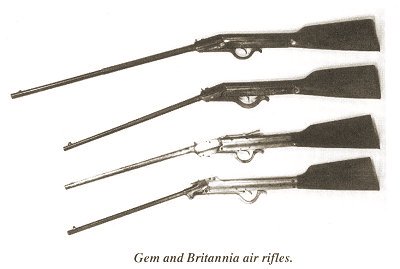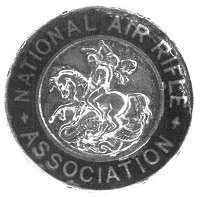BELL TARGET SHOOTING1. History and Early Origins Perhaps of all competitive shooting sports, the air rifle is the least remembered when it comes to its origins as a means of giving enjoyment, plus challenge to marksmen. It was looked upon as a toy or popgun when it first appeared in the back streets of Birmingham in the 1890s. The Britannia rifle was not very powerful, but it did the job of firing small darts or solid "cat slug" dM pellets at a "mark" painted on a piece of wood. The distance for shooting was six or seven yards indoor, or ten to fifteen if shot outdoors, all from the standing position.
Birmingham staged the first ever "not quite so serious" match using the tiny air rifle in the 1900s. A group of enthusiasts from one public house challenged a group from another pub to a shooting match for the prize of a leg of mutton supper for the winners paid for by the losers. That was perhaps for one or two of them, their best meal of the week. Things were pretty hard in those days. Leg of Mutton pub suppers in Birmingham were very common at the beginning of 1900, and the licensing laws were not as strict as they became two or three years later. The instigator of this match was a Mr. M. Hirst, who became a leading light in the development of the sport in the Birmingham area following this small competition. Mr. Hirst is on record as saying, "I remember quite vividly. I was one of the victims of that encounter, but even if that most enjoyable of suppers had cost a thousand times more than the losers were called upon to pay, I honestly think the money would have been well and profitably spent". What these chaps did not realize was the great interest that the match would arouse on the night of the contest. Spectators filled the pub, and like wildfire the thing caught on in such a way that within a few years a National Air Rifle Association was established in the old Arcade, Birmingham, Mr. Hirst’s home town. It had an incredible membership across the country of over 4000 clubs, 1600 of them in Birmingham, with 20,000 shooters, clubs and associations blossoming in almost every town.
This explosion of the popularity of shooting in the licensed houses, had a marked impact and effect on the City Fathers of Birmingham. They looked upon it as a means of gambling and drunkenness in the crowded pubs, such that the magistrates decided that they would not issue a drinking licence to pubs with airgun shooting in, or in any part of, the premises. Up to this time, no one had ever heard of a complaint against the sport, apart from by a few members of the clergy and the Temperance Society. A petition in favour of the pub shooters, signed by 47,000 people, half of the male population of the city at that time, drew a thumbs down from the eighty or so justices, with only a couple in favour of the pastime. That is all it was, a pastime that the hard-working man of the day had accepted into his daily life, in exactly the same way that the higher echelon of the self-employed in the Rifle Volunteers had taken to the enjoyment of long range rifle shooting on their county rifle ranges, at Wimbledon, and then at Bisley. They shot the army rifle in their role as back up Volunteer marksmen for a Government that had perceived that Napoleon could invade Britain in his new steamships should he wish to do so, without waiting for a favourable wind or excuse. What the magistrates thought, and what they could prove, was different matters; no evidence could be put forward to back up their decision. It seemed that they were just "agin it", on principle, believing that the lower orders should not be trained to use guns, even if they were only airguns, as one thing could lead to another. The possibility of anarchy in the streets was the only explanation for the draconian measure to stamp it out. The official reasons put forward by the magistrates - "drunkenness and gambling" - could not have been further from the truth. Today, as in those far off days, one does not have to be reminded that it is impossible to shoot straight if one is in any way inebriated. Alcohol is a depressant which could lower the pulse rate of a nervous competitor, but it would most certainly not help his stance or vision. For the first time in years, these pub shooters had a taste of the discipline that shooting demanded then, and still does today: safety, sobriety, and sportsmanship. All had to be learned and applied if they were to succeed in a team, or individually. Some of the areas of Birmingham at that time were pretty rough to say the least, and so were some of the inhabitants. The landlords themselves knew that their licence was at risk if everything did not meet the highest standards that soon became the norm, and they readily made available a room or backyard. The last person both shooters and landlord wanted anywhere near the pub on a match night was a drunk. But the Birmingham magistrates did not back down. They stood their ground until something happened that even they could not just ignore. The shooting community had called a meeting with the Mayor at the old Town Hall in the Bull Ring. What then occurred is something that should have been written in the annals of shooting sport for all time, something that the shooting community, whatever its disciplines, has very little knowledge of. On that day, over 90 years ago, 10,000 airgunners turned up to put their case personally. They filled the streets and they could not be shown to be drunks or ne’er do wells. Their demeanour and strength of purpose for what was, after all, their right as citizens, was so apparent that it could not be ignored. A special meeting of the whole of the magistrates was called, and the highly offending resolution was set aside. Shooting began again in the pubs Mr. Hirst took quite an amount of flak afterwards, from people who did not approve of shooting. Some would call unannounced at his home, to berate him on the evils of drink and guns. He would convince some of these people of the harmless nature of the sport by taking them to see a match in progress, having an excellent success rate of changed opinions by doing so. |


